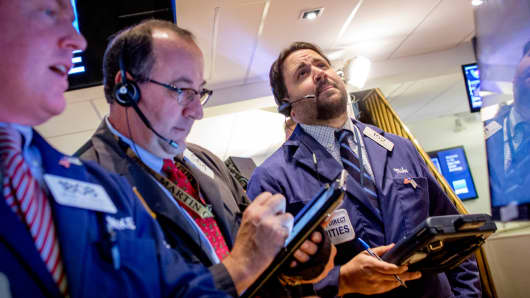Russia. Many are now calling for a possible 1998 Russian-style default after the Russian central bank raised rates to 17 percent to stop the bleeding. Rumor has it that Putin is considering capital controls as his economy spins out of control. Can the Russian crisis be controlled? Western sanctions should remain in place, but any attempt by Putin to come to the table to negotiate should be met with strong diplomatic discussions allowing him to save face while saving his country and possible financial contagion across the globe as evidenced by Pimco on Wednesday. Impact on the market: This is a big wild card for the market. Any collapse of the Russian economy will put downward pressure on the ruble and raise the odds of a debt default, causing panic among investors who will then be forced to sell assets to raise cash. Now this may be temporary, but it is a real risk and one the will be felt by equity investors around the world.
Read MoreOp-ed: Here's the one person who can bail out Putin
Has oil found a bottom? Is recent activity in the energy sector a sign that investors are ready to jump back in? The action of late signals the opportunities that have now been created as a result of the destruction in prices for so many of the energy names. Impact on the market: The ante has been raised — the appeal of current prices may just be too much to ignore. Expect to see traders and investors begin to go bargain hunting, looking to scoop up assets at distressed prices. Expect to see increased activity in the M&A space as large blue chip energy companies seek to find value as evidenced in the nearly completed HAL/BHI.
Read MoreHow low gas prices fuel the housing market
The Fed. Yellen did exactly as expected — changed the terminology but kept everything the same. No rate change, no specific target date, remains ambiguous and "data dependent'" Showcased the differences among the members, which only creates more confusion for investors and the markets as they look for clarity. The takeaway? Central banks around the world will continue to support their economies via a range of stimulative measures and that is good for the markets. Impact on the market: Expect to see the market continue to find broad support because of this central bank action, giving investors/traders the comfort of putting more money to work as rates remain at historic lows. Until the Fed begins the normalization process, the path of least resistance is up. Once they start, investors/traders will decide if our economy is ready and if not, then look for a repricing. If investors are convinced of brighter days ahead then the focus will return to fundamentals and the market will trade accordingly.
North Korea. The chatter about North Korea and Sony's decision to yield to terrorist threats only highlights the new world we are living in. Concern mounts within the industry and the country -- if a group of hackers out of North Korea can infiltrate the Sony technical infrastructure and bring that company to its knees, what does that say about the safety of other companies? More importantly, what does it say about the safety of the U.S. capital markets and the banking industry? This is just another perfect example of allowing technology gone wild. Impact on the market: None. But impact on cybersecurity names is sure to increase as investors look for the next opportunity to invest.
Read MoreLook for up to 15% market upside in 2015: Pro
As we move into the final weeks, with little economic data and no other big expected announcements, it feels like the path of least resistance is up. Lack of volume and lack of participation will exaggerate the moves while there does not seem to be any catalyst on the horizon to once again create nervousness or fear we can expect the market to coast higher into the closing bell on Dec 31. The indexes have regained what they lost in the past week — the move, once again, was swift and decisive.
In the end, all of these concerns will continue to simmer in the background — each with their own ability to create panic. While we cannot prevent emotions from affecting investing pysche, it is important to be able to separate real investor concerns vs. the herd mentality. The damage comes when investors get dragged into the herd mentality trade. Remember, well-run companies will continue to prosper and in the event of an emotional selloff, well-run companies become even more attractive.
A few more days like we saw this week and it will be time to pop the bubbly!


